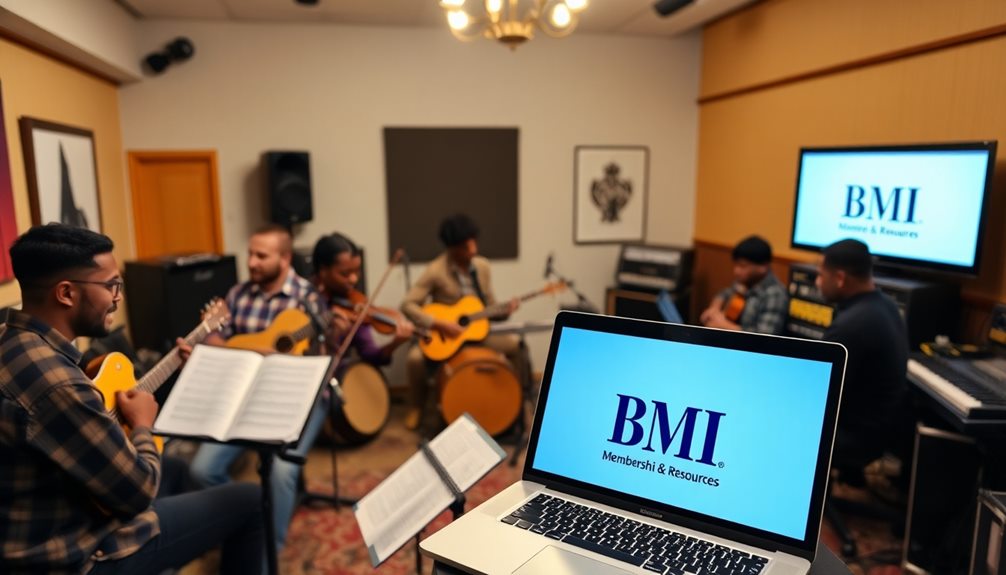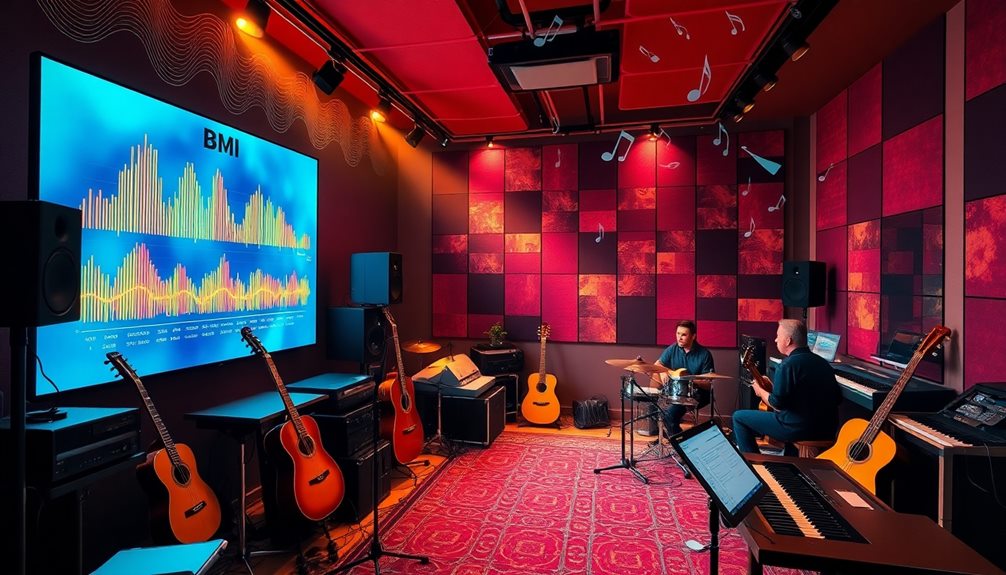BMI stands for Broadcast Music, Inc., and it's super important in the music industry! Founded in 1939, BMI helps songwriters, composers, and publishers earn money when their music is played publicly, like at concerts or on the radio. They manage millions of songs and collect royalties for performances, sharing the money with creators. Joining BMI is free for songwriters, and they offer cool benefits, too. It's all about making sure artists get rewarded for their hard work. There's so much more to discover about how BMI impacts music, so stick around to learn more about this amazing organization!
Key Takeaways
- BMI stands for Broadcast Music, Inc., a nonprofit organization that represents songwriters, composers, and music publishers.
- It manages over 22.4 million musical works and provides public performance licenses for businesses.
- BMI collects and distributes royalties from public performances, sharing earnings equally between songwriters and publishers.
- Membership is free for songwriters, while publishers pay a one-time fee, enabling them to earn performance royalties.
- Joining BMI helps musicians track music usage and ensures legal compliance for public performances.
What Is BMI?
BMI, or Broadcast Music, Inc., is an important player in the music industry, serving as a nonprofit organization that represents over 1.4 million songwriters, composers, and music publishers worldwide. Founded in 1939, BMI acts as a performing rights organization that helps musicians earn money for their hard work.
With a massive repertoire of over 22.4 million musical works, BMI licenses music for public performance in places like radio, TV, and live venues. This means that when you hear your favorite songs played, BMI is often behind the scenes, making certain songwriters receive their royalties.
In FY 2022, BMI reported impressive revenues of $1.573 billion, distributing $1.471 billion in royalties to its members.
How does this happen? BMI collects blanket license fees from businesses that use music, then shares these earnings with songwriters and music publishers quarterly. This system guarantees creators have a steady income stream, allowing them to focus on making great music.
BMI's Role in Music Licensing

In the domain of music licensing, Broadcast Music, Inc. plays an essential role in ensuring that artists receive fair compensation for their work. As a leading performing rights organization, BMI helps songwriters, composers, and music publishers by managing a vast collection of music.
With the rise of digital platforms, the importance of organizations like BMI has grown, as they navigate licensing complexities in the online space, providing AI online jobs that help support their efforts.
Here's how BMI works in music licensing:
- Licensing Music: BMI provides licenses to businesses like bars, restaurants, and gyms, allowing them to play music legally in public settings.
- Collecting Fees: When these businesses use music, they pay blanket license fees to BMI, which makes it easy for them to play many songs without hassle.
- Distributing Royalties: BMI collects royalties from these fees and distributes about 88% of the total to its members quarterly, ensuring artists get paid for their creations.
- Tracking Usage: Using advanced technology, BMI tracks music usage accurately, so royalties are fairly distributed based on actual public performances.
With BMI's support, artists can focus on creating music, knowing their rights are protected under copyright law.
This system helps everyone enjoy music while ensuring those who create it are rewarded!
Understanding Performance Royalties

Performance royalties are super important for songwriters and publishers, and they happen whenever your song gets played in public.
Whether it's at a concert, on the radio, or even in a cozy bar, every play counts!
Understanding sound recording techniques can also enhance your music's exposure and potential for earning royalties.
Let's explore how these royalties work and how they're shared so you can understand just how valuable your music really is.
What Are Performance Royalties?
Royalties play a crucial role in the music industry, especially when it comes to compensating songwriters and publishers for their work.
Performance royalties are special payments made when your music is publicly performed. This includes live concerts, radio broadcasts, and plays in public venues. To guarantee smooth transactions and timely payments, it's important for musicians to reflect on systems that facilitate Merchant Services tailored to their needs.
Here's what you need to know about performance royalties:
- BMI collects these royalties on behalf of its members, ensuring they get paid for their music.
- Songwriters must register their works with a Performing Rights Organization (PRO) like BMI. This registration is essential for tracking and payment.
- Performance royalties are split 50/50 between songwriters and publishers, so both parties benefit from the music's use.
- These royalties don't include mechanical royalties or those from digital streaming, which need separate registrations.
How Royalties Are Distributed
Understanding how royalties are distributed is key for songwriters aiming to maximize their earnings. When your song is played publicly—like at concerts, on the radio, or in venues—you earn performance royalties. Organizations like BMI collect these royalties on behalf of songwriters and publishers. It's important to register your songs with BMI so you can receive these payments!
BMI splits the performance royalties equally, giving 50% to you, the songwriter, and 50% to your publisher. This is part of a total distribution percentage of 200%. Excitingly, about 88% of the royalties collected are sent directly to BMI members. The organization keeps around 12% for its operational costs, which helps them continue supporting songwriters like you.
Once your royalties reach at least $250, you'll receive your payment via direct deposit every quarter. This makes it easy and quick for you to get your money!
How to Join BMI

Joining BMI is a fantastic way to kickstart your music journey!
It's simple and free for songwriters, but if you're a publisher, you'll need to pay a one-time fee.
Once you're a member, you can track your songs, earn royalties, and enjoy great resources to help you shine in the music world!
Registration Process Steps
To become a part of BMI as a songwriter, you'll need to follow a straightforward registration process. It's free for songwriters, making it easy for you to join! Here are the steps you should take:
- Complete the Application Form: Head to the BMI website and fill out the online application form. You'll need to provide some personal and professional details, so be ready!
- Submit Your Songs: After you register, don't forget to register your songs! This is essential to earn performance royalties. You can upload your tunes through BMI's online portal.
- Join the BMI Live Program: Once you're all set up, take advantage of the BMI Live program. It helps you track and earn royalties from your public performances.
- Get Paid: Royalties are paid via direct deposit. You'll start receiving payments once you reach the minimum threshold of $250 per quarter. This guarantees you get your hard-earned money on time!
Now you're ready to immerse yourself in the world of BMI and make your music shine!
Membership Benefits Overview
Becoming a member of BMI comes with a range of benefits that can greatly enhance your music career. First, joining as a songwriter is free! This means you can start collecting performance royalties from over 22.4 million musical works right away. For music publishers, there's a one-time fee of $150 or $250, depending on your company size.
Once you're a member, BMI directs 90% of its licensing fees straight to artists. This guarantees you get a significant portion of the revenue from your hard work. When your royalties reach $250 each quarter, you'll enjoy direct deposit payments, so you won't have to wait long for your earnings.
Plus, BMI offers membership benefits like discounts on music gear and access to educational programs. These programs can help you grow and improve your skills as a songwriter or publisher.
Whether you're creating new music or promoting your existing works, BMI supports you every step of the way. So, if you're ready to take your music career to the next level, consider joining BMI and enjoy all the fantastic benefits that come with it!
Fees and Requirements
Maneuvering the membership process at BMI is straightforward, whether you're a songwriter or a publisher.
Here's a quick guide on what you need to know about fees and requirements:
- Songwriters can join BMI for free, but there's a one-time sign-up fee of $75.
- Publishers need to pay a one-time fee: $150 for solo publishers and $250 for larger companies.
- You must register your songs with BMI to earn performance royalties, which you can do easily through their online portal.
- To collect royalties, you need to reach a minimum threshold of $250 per quarter for direct deposit payments.
Copyright Basics for Musicians

Understanding copyright basics is essential for musicians to protect their creative work. When you create music, your song is automatically copyrighted! This means it's protected under copyright law as soon as you finish composing. You don't need to register it right away, but registering with the U.S. Copyright Office is a smart move. It helps you if someone infringes on your work, allowing you to sue for statutory damages and attorney's fees.
Joining a Performing Rights Organization (PRO) like BMI is also beneficial. While it doesn't guarantee copyright protection, it helps with tracking your music and collecting royalties.
Remember, copyright law can vary by country, so it's important to research local rules and options for international protection.
If you're serious about your music, consider obtaining ISRC codes for your recordings. These codes assist in identifying and tracking your music across different platforms.
Understanding these copyright basics will empower you as an artist. You'll feel confident knowing how to safeguard your creations and make certain that your hard work is respected!
Licensing Costs and Factors

When it comes to licensing music, several factors can influence the costs you might face as a business owner. Understanding these factors will help you make informed decisions about BMI licensing.
- Number of Locations: Your annual fees will vary depending on how many places you operate. Small businesses might pay around $182, while those with up to 9 locations can see fees rise to $2,515.
- Square Footage: The total space you have affects your music usage, which can impact your costs.
- Type of Music: Whether you're using recorded, visual, or live music can change the pricing structure. It's best to ask BMI directly for tailored quotes.
- Blanket Licenses: BMI offers blanket licenses that give you access to a huge catalog of over 22.4 million songs, helping guarantee compliance with music licensing regulations.
Managing Music Legally in Business

Maneuvering the complexities of music licensing is vital for businesses that want to play music legally in public spaces. You need to secure licenses from performing rights organizations (PROs) like BMI. This guarantees compliance with copyright law and fair compensation for music creators. Here's a simple breakdown of what you need to know:
| License Type | Annual Fee |
|---|---|
| Single Location | $182 |
| Two to Five Locations | $400 |
| Six to Nine Locations | $1,076 |
| Ten or More Locations | $2,515 |
| Commercial Streaming | Varies |
To get started, select the appropriate license type, fill out an application, and pay the fee. Once you have your license, it's vital to maintain compliance with its terms. BMI actively monitors for unauthorized use of music, and violations can lead to hefty fines. For easier management, consider using commercial music streaming services that cover multiple PRO catalogs, making it simpler to enjoy music without the headaches. By following these steps, you'll create a joyful atmosphere for your customers while keeping everything above board!
Frequently Asked Questions
What Is BMI Used for in Music?
BMI's used to collect licensing fees from businesses playing music, ensuring artists get paid for public performances. You'll need a BMI license to legally use music in venues, broadcasts, or any public setting.
What Does BMI Do for Artists?
BMI helps you earn performance royalties when your music's played publicly. With technology tracking usage, you don't have to worry. Plus, you gain access to educational programs and discounts, enhancing your music career.
Who Needs a BMI Music License?
If you run a bar, restaurant, gym, or any venue playing music for public performances, you need a BMI music license. It's essential for compliance with copyright laws and ensuring artists receive proper compensation.
How Does BMI Know When Your Song Is Played?
BMI knows when your song's played by using technology to monitor various platforms. They collect data from radio, TV, and digital services, ensuring accurate tracking and fair distribution of royalties owed to you.
Conclusion
Now that you know what BMI is, you can see how it helps musicians just like you! Think of it as a superhero for your music, protecting your rights and making sure you get paid when your songs are played. Joining BMI is like getting a VIP pass to the music world! So, don't wait—dive in and start managing your music the right way. With BMI by your side, your creative journey can be even more exciting!









